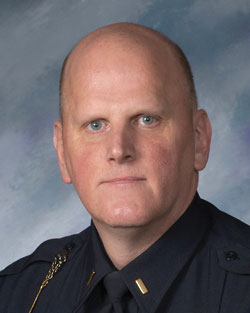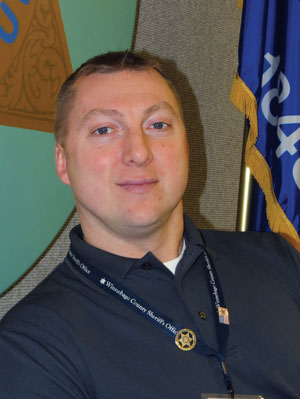Behind the badge
From the days of “The Andy Griffith Show” to today’s “CSI” spin-offs, the world has changed since the times of Mayberry. Law enforcement makes its way to TV screens nightly through the news or popular programming, but what do men and women who carry the badge really encounter?
“It’s not like TV, not everything is going to be solved in an hour,” says Jeff Malcore, Lt. of Investigations with the Neenah Police Department.
Headlines and plot lines also don’t always provide an accurate portrayal of what happens within police departments, especially the ones right in our own backyard.
“There are tens of thousands of confrontations a day,” Malcore shares of what officers across the country face daily. “The confrontation in Ferguson (Mo.) just went crazy. It’s frustrating when we’re all painted with the same brush.”
Here is a look at officers who are making a positive impact in the line of duty in the Fox Valley area.
Sgt. John Wallschlaeger, city of Appleton Police Department
Just as the side of an Appleton Police Department squad car states, Sgt. John Wallschlaeger is “Fighting Crime … Solving Problems.”
At the age of 38, Wallschlaeger joined the Appleton Police Department in 2002 after taking up a second career in law enforcement beginning in 1993. He felt there was more to life than selling cars and discovered his calling was Crisis Intervention Training.
“It would probably be the pinnacle of my career,” he says. “If there wasn’t so much stigma associated with mental illness, more people would probably talk about it.” One in four families are affected.
Prior to CIT, the mentally ill were criminalized without getting to the bottom of the problem, says Wallschlaeger. He aimed to change that in 2003 when he approached then Appleton Police Chief Richard Myers and was sent to Akron, Ohio in 2004 for training.
“That was like giving me a blank check,” Wallschlaeger says. “Once people discovered we had this training, the phone has never stopped ringing.” The APD was the first department in the state to adopt CIT. Due to Wallschlaeger’s impact, there are now 1,500 Wisconsin officers who have been trained on the Memphis Model of CIT.
“His legacy as an Appleton Police Department officer will be the strong foundation he’s provided officers on how to appropriately respond to a crisis involving a member of the community living with mental illness,” says Appleton Police Chief Todd Thomas.
While Wallschlaeger has received CIT awards and positive feedback from fellow officers, it was never about him, he says. He will retire in April to devote his attention to CIT full time.
“I did become very determined to make this program stick,” Wallschlaeger shares. “I realized I had to make a commitment. I realized this was bigger than me.”
Patrol Officer Chris Groeschel, city of Menasha Police Department
Chris Groeschel, 2010 NAMI Officer of the Year, believes in giving back to his hometown, the city of Menasha. Now, as a patrol officer for the police department, he feels his role is the “calling” he was meant to be doing after being in electronics for 11 years.
“The taxpayer paid for me to go to school. Now is may chance to give back,” he says. “That gives you the incentive and push.”
Groeschel, who has become involved with Crisis Intervention Training, doesn’t believe in pushing help upon people, but wants to get services to individuals who could benefit from them most. He continues to check in periodically with people he has come in contact with during his career.
“You didn’t know what was out there until you got in this job,” he says. “You don’t know about everyone with mental health issues because they’re so buried in the system.” Groeschel is now extending help to his fellow officers by implementing a peer support program at Menasha PD.
“Every bad incident is a drop of water in the glass and sooner or later, it’s going to overflow,” he shares. “You’re always looking at stuff, you can’t always leave it at the door.”
He’s aiming to eliminate the stigma surrounding officers who are in need of assistance. Now, when they are involved in cases of significance, the eight agencies within Winnebago County who are participating in the program, are being proactive about talking to officers, and in some cases, their families. The departments also are checking in with new recruits more often.
“Chris is one that really embraces the concept of community both in and out of service,” says Police Chief Tim Styka. “He is one who has really taken an interest in not only the problem, but getting to the root of it.”
Officer Tiffany Tesch, Fox Valley Metro Police Department
“No” is not a word that’s part of Tiffany Tesch’s vocabulary. She’s constantly wearing different “hats” and interacting with the community, both on and off duty as an officer of Fox Valley Metro Police Department.
“From the time I was little, it was something I was always excited about,” says Tesch of the opportunity to enter law enforcement. “I am definitely not a delicate flower by any means.”
The self-proclaimed “tomboy” and “adventure junkie” is involved in everything from fundraisers for Special Olympics to mentoring a student in the Little Chute School District. She does, however, also use her vacation time to volunteer as a mentor among other officers and survivors (children over 18) at C.O.P.S. (Concerns of Police Survivors) Camp for children, ages 6–14, who have lost their parents in the line of duty. This summer will be her fourth year going to East Troy where the camp is held at the Salvation Army Lake Camp.
“It paid dividends because I don’t think I’d be where I am without those experiences,” says Tesch who doesn’t have children of her own. While she admits the first year of the camp was a bit overwhelming and exhausting, the experience was eye-opening.
“It’s the most crazy, rewarding experience I’ve ever had,” she shares. “You’re all there for the same purpose, to be there for these kids. … You make impressions for a lifetime even if you don’t talk to them all the time.”
Chief of Police Erik Misselt says Tesch is “very generous with her time.”
“She’s a bundle of energy and a great officer,” he adds. “She is dedicated to the profession and people.”
Capt. Mike Velie, town of Grand Chute Police Department
Trouble in neighborhood hotels and motels led to an increased volume of calls in the town of Grand Chute prompting the police department to pursue further action.
“We realized the benefit of proactive policing,” says Capt. Mike Velie. “Addressing issues before they became a problem.”
Grand Chute has more hotels — 23 — than the whole Fox Valley combined, which led to the department’s creation of best practices and polices, along with a new ordinance introduced in 2012 and soon thereafter, the Community Hotel Interdiction Program or “CHIP.”
With CHIP, hotel owners are being held accountable for how many calls of service are made to their respective locations. Now, a certain amount is alloted, based on the number of rooms at the establishment, before a citation is issued.
“You’re responsible for your property and who stays at your property and you’re going to be held accountable,” Velie says.
Appointed liasion officers work with area hotels to make sure they’re on track and how they can make things safer for guests. They can, however, fluctuate in a tiered scale from “1” to “3” — “3” being the highest volume of service calls.
Since starting the program, the department has seen a 20 percent decrease in hotel-related calls involving drugs, prostitution, homicides and other problem areas. Additional benefits include making the businesses safer for employees and guests, reducing neighborhood crime and raising property values. Other departments are taking notice as well and calling for details on the initiative.
The now accredited department also recently received a ProPhoenix Significant Program Award for the strides that have been made with this effort.
“Accomplishing the task itself and also the award is meaningful because it was important to the community,” says Chief of Police Greg Peterson. “Being recognized for that accomplishment and receiving the ProPhoenix Award is really icing on the cake.”
Lt. of Investigations Jeff Malcore, city of Neenah Police Department
After 30 years in law enforcement, Jeff Malcore is preparing to trade in one title for another. The Lt. of Investigations for the city of Neenah Police Department will leave the line of duty this month to become a full-time Criminal Justice instructor at the Fox Valley Technical College Public Safety Center.
“We’re really trying to teach them (students) that they have to see before they shoot,” explains Malcore who has been with Neenah PD for 27 years, including his most recent position with the SWAT Team. “They have to see a threat before they react to the threat.”
The newly opened Public Safety Training Center houses two indoor and four outdoor ranges. According to Malcore, students take “baby steps” to work up to getting comfortable with shooting a .40 Caliber Glock handgun, after utilizing a laser or paint ball-type gun of similar size and weight.
“My goal is always to teach my students to be better than I was,” Malcore adds. “You can have an awesome career. Just keep your attitude straight.”
The center also has DAAT training rooms, along with a bank, hotel, bar, gas station/convenience store, single-story house, two-story house, plane and more to help officers with their training.
“We’re really blessed to have something like this because we can put our officers in real-life situations,” says Malcore, adding that things have come a long way since his days of training.
Students also are lucky to have an instructor who can pass along knowledge from a varied career.
“Much of Neenah PD’s reputation throughout the state (and beyond) is due to Jeff’s diligence as a trainer,” says Chief Kevin Wilkinson. “I’ve never been an amputee, so I can’t say I know how it feels to lose a limb. But losing Jeff, albeit to an ally, feels a bit like the department has lost a hand … a very talented hand.”
Winnebago County Sheriff’s Department
Just as in the days of Sherlock Holmes, when a crime happens, there is detective work to be done. In this day and age, however, the crimes are changing.
“It’s been amazing the things they’ve been able to solve,” says Winnebago County Sheriff John Matz. “A lot of it is just by rolling up their sleeves and working as a team.”
“That’s part of why this division is special,” adds Detective Lt. Chris Braman of the work the detectives do in evidence processing, interviewing and obtaining warrants. “Even though a person may have done something that repulses you, you still have to go in and interview them and get them to trust you.”
The department investigated four heroin deaths last year and is making tracking these crimes a priority. The Winnebago County Drug Enforcement Unit launched in January and will assist area departments who are struggling to keep up with the increasing demand.
“We’re holding them accountable for the death and not just dealing a small amount of heroin,” says Matz.
Chicago is one of the largest sources for drugs in the country, according to Braman. As the drugs move north, prices increase. Five years ago, a bindle, or personal use-sized portion of heroin, cost $20–30, but has increased to $40–60 on average. A gram, or 10 bindles, has gone from $125 to $250 and are being cut with sleeping aids, flour and other unknown items.
“There’s no way to tell if it’s any different,” says Braman, noting that addicts will continue to snort and use the drug intravenously because it’s an “immediate hook.” A wide range of individuals of varying age and social status use the drug.
“That’s why we have to be empathetic,” says Braman. “None of us have ever had an addiction problem, but until you walk a mile in someone else’s shoes (you don’t know what they’re facing).”
Trevor Frank, chairman of the city of Kaukauna Police Department K-9 Fundraising Committee
“A K-9 unit was always one of those things on the cutting room floor,” says Trevor Frank. A little over a decade ago, Frank became involved with starting a unit for the Appleton Police Department. Several dogs and departments later, he’s now taking up the cause in his hometown of the city of Kaukauna and serving as the chairman of the K-9 Fundraising Committee.

Trevor Frank and Kaukauna Chief of Police John Manion with Jico, K-9 dog for the city of Appleton Police Department Photo credit: Dave Jackson
“I know a lot of these officers, and I know what kind of challenges they face,” says Frank.
K-9 dogs, either German Shepherd or Belgian Malinois in breed, are a triple threat in tracking and apprehension, drug detection, and handler protection, says Frank. The Kaukauna Police Department has not hired additional officers since 1998, yet crime has increased, says Chief of Police John Manion.
“He knows how to stimulate this community and get this thing going,” Manion notes of Frank’s efforts.
He’s hoping that the unit will be operating within a year and a half. The goal is to raise $90,000. Frank has managed to raise $35,000 since October, which is half of what’s needed to buy a dog, train it, pick an officer, and purchase a squad car and kennel. The additional $20,000 after hitting $70,000 will be used to maintain the dog for three years without taxpayer dollars, after which time the K-9 unit will become a line item in the department’s budget.
“I think I’ll keep doing it until I get bored with it or there isn’t a need in the community, but I don’t see that happening anytime soon,” says Frank. “It’s humbling. … These things are more far reaching than people think even if it touches one life.”
Outagamie County County Sheriff’s Department
Thinking outside the box, or in this case a jail cell, led the Outagamie County Sheriff’s Department to restructure a facility.
The former 28-bed county juvenile detention facility, which closed in January 2014, now houses adult inmates with medical and mental health issues.
“We found that by keeping them in a smaller area — the officers know more about them,” says Capt. Dave Kiesner, who also serves as the jail administrator, of inmates receiving the services.
Individuals moved to this area could have health concerns, be at increased risk of suicide or are simply not able to function around the general population where they were previously placed. There also is now an increased continuity in care.
“The whole facility has had a positive impact,” adds Sheriff Brad Gehring.
An assessment of all inmates is now done to see what condition they are in, what offenses they have committed, what happens next and how they come out of the system.
“It takes some time to evaluate those issues and for the wheels to turn,” says Kiesner. “Every offender is different. Every offender has their own baggage.”
“We just don’t put them in a cage and turn them loose,” echoes Capt. Mike Jobe. “Jail is a great deal more than just locking them up for six months.”
An inmate’s time behind bars affects not only them, but their family, education and their health. Inmates who choose to assist with chores like laundry and kitchen duties receive time off their sentences. Kiesner adds that they have more invested, more to gain and more to lose if they mess up. The Outagamie County Jail also is a high school equivalency diploma test site and employs a full-time teacher.
“None of this happens without the foresight and leadership of Brad Gehring,” adds Jobe. “We really do have to give credit to the sheriff.”
Editor’s note: FOX CITIES Magazine attempted to include the Calumet County Sheriff’s Department in this article. The department could not be reached for comment.
—FC

















Leave a Comment